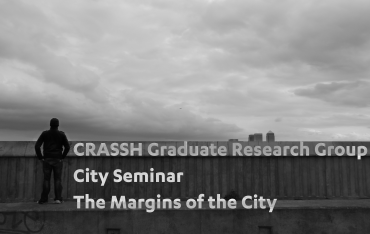
Submitted by Administrator on Fri, 16/01/2015 - 10:03
Seminars take place on alternate Mondays at 17:30 in Room SG1 of the Alison Richard Building, 7 West Road, CB39DT. For more information visit www.crassh.cam.ac.uk/programmes/city-seminar
26 January at 17:30
EVACUATE
In this paper I explore how evacuation – the arts, logics, rationalities and technologies – the complex geographies of moving people out of the way – has evolved as a series of contradictory processes of governing mobility under conditions of emergency. I will explore, very briefly, the origins of evacuation, particularly its rapid evolution, mechanisation, systematisation and medicalization in war-fighting, its rapid displacement into the logics of state, territory and security during and after the Second World War, and its development as urban protection measures into the Cold War. Where the paper spends most time exploring, however, are the ways in which evacuation fails, and, sometimes, where it was never intended to work at all. It will examine how evacuation (through all its legal and bureaucratic ambiguity) as a process of protection has come to be performed as dispossession (of property and place), spatial incarceration or internment, and, at worse, when one could be evacuated to death.
9 February at 17:30
Skateboarding and the City: From Margin to Centre
Prof. Iain Borden (University College London)
In this talk, I trace the way in which the urban practice skateboarding has moved from a predominantly marginal position in the city – marginal in geographic, cultural and economic terms – to play an increasingly central and/or integrated role in urban cultures and developments. Practised by tens of millions worldwide, skateboarding today makes an important contribution to our current architecture, creative industries, commerce, entrepreneurship and social capital. The talk ranges from California in the 1960s and 1970s to London, Kabul and Indiana in the present day, and from concerns with methodological concerns with history and critical theory to representations in film, music and art.
This session is run jointly with Civic Matter.
23 February at 17:30
An Urban Perspective on State Fragility in Lebanon
Dr. Sara Fregonese (University of Birmingham)
International military aid to tackle Lebanon's state fragility and reaffirm its sovereignty has predominantly focussed on reinforcing its territorial boundaries. Currently, much international aid is concentrated on securing Lebanon's northern border, aiming to contain a 'spillover' of conflict from neighbouring Syria. However, borders are not where Lebanon's state fragility and fractured sovereignty are most apparent. Rather, social polarisation, division and sectarian conflict have, historically, been focused in Lebanon's cities, where hybrid arrangements of sovereignty have blurred classic binaries such as legitimate/illegitimate and state/nonstate. Through the example of UK military aid to the Lebanese Armed Forces, this seminar reflects on the tensions between state-centred approaches of international donors and volumetric and hybrid geographies of persisting urban violence.
9 March at 17:30
Militant Masks: youth and insecurity in the Niger Delta
Prof. David Pratten (University of Oxford)
Youth in contemporary Nigerian parlance, has become a term of exclusion and nowhere in West Africa are issues of youth and equity more sharply focused than in south-eastern Nigeria and the oil-producing areas of the Niger Delta. This paper concerns the mechanisms by which young people in southern Nigeria deal with and are engaged in a context of radical insecurity. It focuses on agaba, a group that has expanded its membership across the multi-ethnic coastal plain of south-eastern Nigeria since the late 1990s. Agaba members are regularly linked with electoral violence and urban gang conflict, and have been variously framed as 'masqueraders', as 'area boys', and as 'local militia'. Drawing on ethnographic research on agaba in the city of Calabar, this paper examines how marginalised youth enter into relations with state authority that combine elements of complicity, insurgency, monitoring and violence. These micro-politics of vigilance are based on knowledge of the states' patrimonial 'ways of operating' and processes which define internal, localized rights, registers and styles of action. The paper argues that rather than normatively loaded concepts of 'generative' or 'insurgent' politics, the concept of vigilant politics enables us better to understand the practices by which youth deploy their own marginalised status to insert themselves into Nigeria's rentier state.

